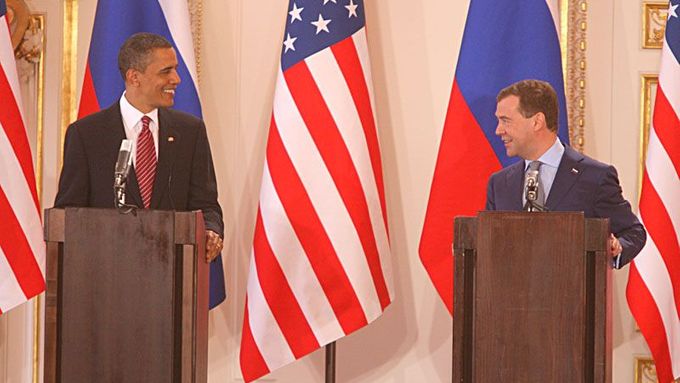Looking at what happened in 2010 in Czech foreign relations, one cannot but conclude that the key factor that determines the Czech Republic's foreign policy is its geopolitical position of a "bridge" between the Atlantic civilization and former Soviet union in general, and United States and Russia in particular. This geopolitical situation brings both problems and opportunities.
A new strategic arms reduction treaty (START) between the USA and Russia was signed on 8 April 2010 in Prague, precisely because the capital was seen as a symbolic "bridge" between the two powers whose bilateral relation is still heavily burdened by the Cold War-era distrust.
START treaty signature in Prague: A breath of fresh air
One of the issues that make the relation so troublesome is the overwhelming importance of the USA in Central Europe, still seen by Russia as its geopolitical sphere of influence. After the Bush-era plans to install anti-ballistic missiles in Poland and radar in the Czech Republic shipwrecked, fiercely opposed by Moscow as a threat to its national security, Obama administration now proposes a new "anti-missile umbrella" project within the NATO framework, with Russian concerns taken more into account.
Details of planned US missile warning center revealed
As US political analyst Fareed Zakaria said in an interview with Aktualne.cz, "Obama has achieved a better working relationship with Russia than the previous administration had... but it will not allow Russia to do anything adventurous in Central Europe."
As for the issue of energy security, the Czech Republic (and most other European countries) depend on deliveries of Siberian oil and above all gas, which makes many policymakers seek diversification. Also, fears of "gas wars" between Russia and its unreliable middlemen, Ukraine and Belarus, are already something as a Christmas tradition.
The Czech contribution to the NATO efforts in Afghanistan continued in 2010, and the country also figured in the US diplomatic cables revealed by WikiLeaks.
In 2010, Czech President Václav Klaus left no doubt which side he is on in the discussion about the global warming.
Klaus to spread clima-skeptic word in Arabic, Japanese
Speaking about which, some people are already feeling its effects in a very drastic way. Micronesia, a Pacific island-nation, objected against the modernization of a Czech coal plant, arguing that burning carbon in the Czech Republic (as well as other states) directly threatens the Pacific nation's existence, regardless of the distance between the two states.
